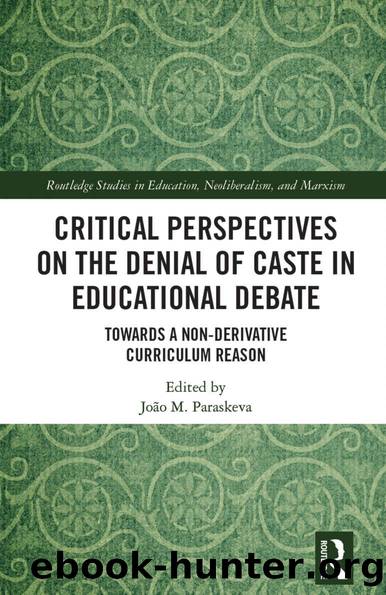Critical Perspectives on the Denial of Caste in Educational Debate (Routledge Studies in Education, Neoliberalism, and Marxism) by João M. Paraskeva

Author:João M. Paraskeva [Paraskeva, João M.]
Language: eng
Format: epub
ISBN: 9780367725105
Publisher: Taylor and Francis
Published: 2023-07-26T18:30:00+00:00
Tests in Caste Guise
Testocracy builds upon the notion that the idea of merit is now a settled fact. It is considered as the most essential part of a developing society. Thus, the normalizing of such merit has turned us to looking for test-based qualities. This essentially is a monopolistic reservoir of the privileged and elites of our society. Therefore, certain amounts of tests as qualifiers to decide a studentâs fate has upended the purpose of education, which was to nurture the community and not produce an idiosyncratic personal. Guinier comments that such testocratic merit prizes âproduction and reproduction of privilege but without shame or obligationâ.18
There is an evasion from the political and moral accountability if viewed through the lens of merit. Merit begets entitlements. Entitlement becomes vital to ascertain oneâs responsibility to society. For as long as entitlements soothe the power hunger of the âcocky boysâ and girls, there remains a fundamental gap in accountability that risks the rise of rampant corruption.19 The elites who have no accountability to the society they live in have very little investment in paying back society. This radically alters the original meaning and purpose of merit.
However, with the marginalized groups, we find differing experiences. In the case study of African American students who got admitted to schools, it was observed that these students often took responsibilities of their community. Many students in this category turned out to become leaders in their communities and representatives of their cause in business and social sectors. We do not yet have a detailed study of the contribution of the Dalit students to society.
The tests, too, do not measure the smartness of students, and they disregard the immense cultural, economic and, most importantly, family factors. Guinier quotes a study by economist Rothstein Jesse, which states that the SAT is a common qualifier as a reasoning test that only indicates how students cope in the first year of their college program. These tests do not have the capacity to predict the future performances of the students. This essentially brings a rude and disgraced behavior among the breed of graduates who harbor the feeling of deservingness, which is to negatively ascribe their primary and sole ownership, all the while remaining unaccountable to the unpredictable future.
The SAT-oriented model is also an assumption-based strategy which is based on hunches. The entrance exams and multiple-choice questions are given to select the right answer from a misleading set of options and opinions. You cannot guarantee the selection of talent and merit by selecting the right answer. After all, what is right is not right unless it is proven right. President of the Bard College Botstein, in his widely popular article in the Times magazine, pointed out the limitations of the SAT as âa bizarre relic of long outdated twentieth centuryâ assumptions. He continued, âAs every adult recognizes, knowing something or how to do something in real life is never defined by being able to choose a ârightâ answer from a set of possible answers (some
Download
This site does not store any files on its server. We only index and link to content provided by other sites. Please contact the content providers to delete copyright contents if any and email us, we'll remove relevant links or contents immediately.
The Art of Coaching Workbook by Elena Aguilar(51201)
Trainspotting by Irvine Welsh(21668)
The Secret History by Donna Tartt(19092)
Twilight of the Idols With the Antichrist and Ecce Homo by Friedrich Nietzsche(18635)
All the Missing Girls by Megan Miranda(16031)
Cat's cradle by Kurt Vonnegut(15359)
Ready Player One by Cline Ernest(14677)
Talking to Strangers by Malcolm Gladwell(13370)
Fangirl by Rainbow Rowell(9254)
The remains of the day by Kazuo Ishiguro(9000)
The Compound Effect by Darren Hardy(8969)
Thirteen Reasons Why by Jay Asher(8912)
Tools of Titans by Timothy Ferriss(8396)
Periodization Training for Sports by Tudor Bompa(8273)
Wonder by R. J. Palacio(8113)
The Lover by Duras Marguerite(7903)
A Court of Wings and Ruin by Sarah J. Maas(7848)
Change Your Questions, Change Your Life by Marilee Adams(7783)
The Complete Stick Figure Physics Tutorials by Allen Sarah(7373)
